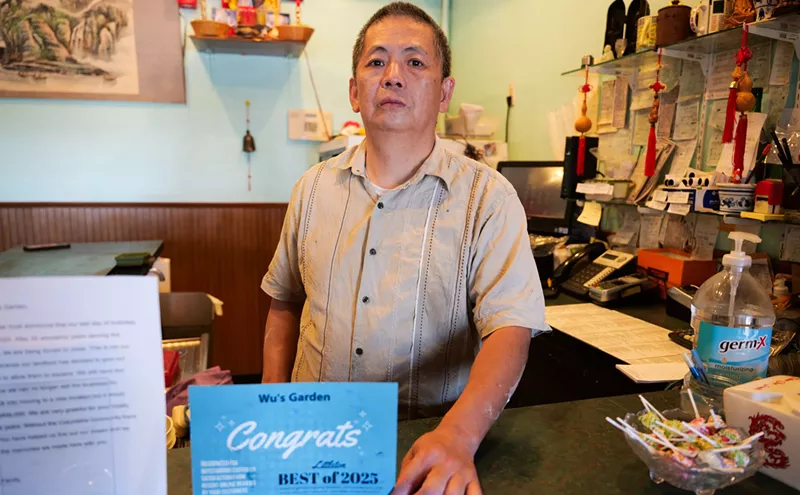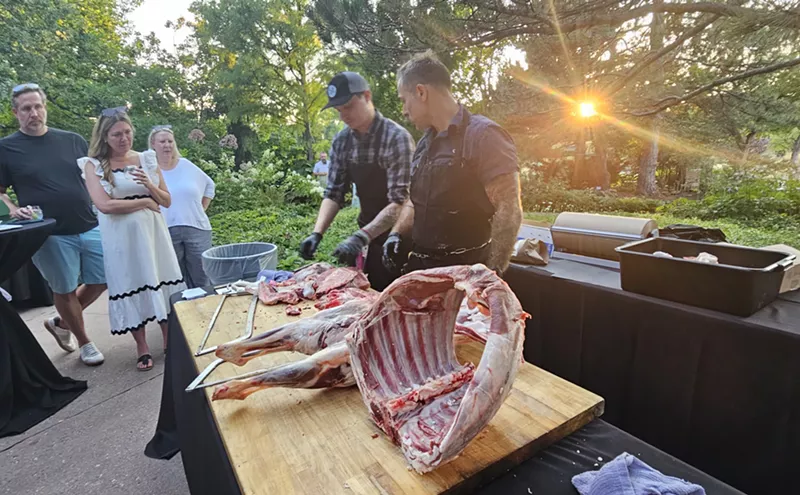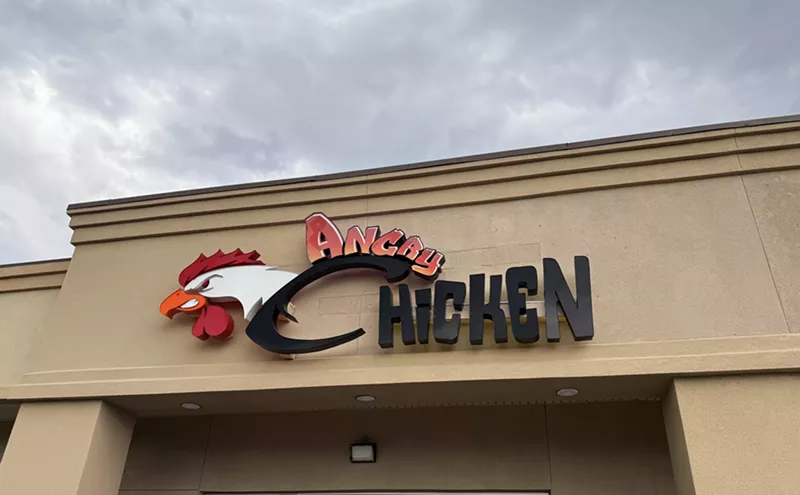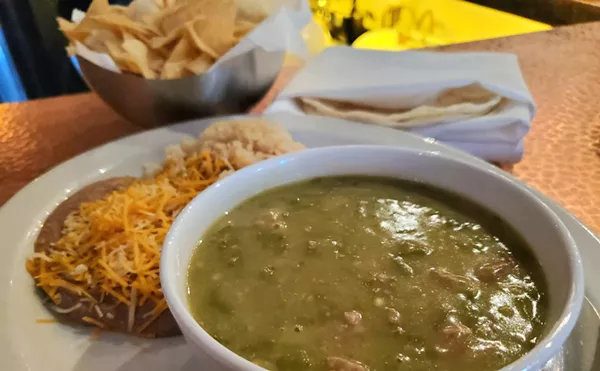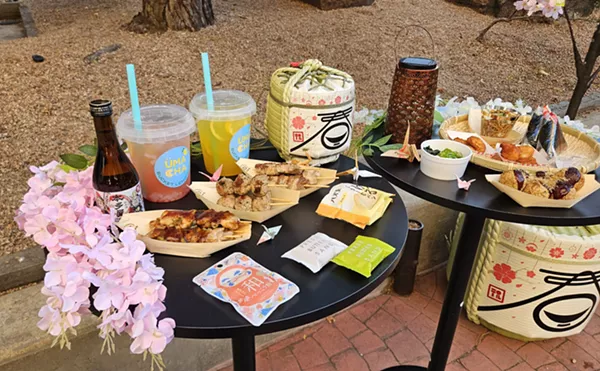They were confident that they could take on Governor Bill Owens, the Colorado Legislature, the Colorado Restaurant Association -- which, in total abandonment of a large portion of its constituency, went sissy and backed the statewide ban because, in the CRA's opinion, one comprehensive ban was fairer than a hodgepodge of local bans, and besides, giving in and giving up is always easier than fighting a long battle destined to be lost by inches -- and everyone else in this nanny state who feels it's their responsibility to tell people how to live their lives and run their businesses.
Ben and Shannon had no lawyers or lobbyists on their side, no polling units or phone banks or friends at the Capitol. They really had no understanding of how the legislative process worked beyond what they remembered from that Schoolhouse Rock song about the little bill that wanted to become a law. "We were just sitting in the living room one day, and we figured maybe we could do something," Shannon says. "So we got on the Internet that night and started learning."
"It was basically a ground-up kind of thing," Ben adds. "But I was thinking, you know, look at that pot-initiative guy." Not only did Mason Tvert manage to get Initiative 100 on the Denver ballot last November, but it passed -- and now it's legal to own less than an ounce of weed in Denver (if you ignore state law). And come November 7, there may be another initiative on the statewide ballot calling for the legalization of marijuana possession across Colorado. "He was, like, 24," Ben continues. "I'm 25. If he can do it, why can't I?"
Ben and Shannon decided that their best bet was an initiative, too, one that would ask voters to overturn the smoking ban already signed into law by Owens. They'd call their proposal the "Smoking Ban Repeal Initiative," and even if Coloradans voted against the repeal, that would be okay with Ben. "At least then, it's not what the government is telling us to do," he says. "It's what the people wanted. I just wanted us to be the decision-makers on this, not them."
What pissed him off wasn't the new law so much as the way it had been enacted, over the strident objections of some private citizens and business owners, and with loopholes for a select few. The market -- a beautifully self-correcting entity -- was already leaning in a non-smoking direction, with the vast majority of fine-dining restaurants, most hotel restaurants, many family restaurants and bars, and even some clubs choosing to ban smokers from lighting up inside. Smokers knew where they were welcome, knew there were places where even certain bitter young restaurant critics could go for a couple cups of coffee and a smoke while reading the newspaper or scribbling down rants about sushi and strip malls.
When I met Ben and Shannon, they'd already drafted their initiative and sent it to a legislative committee for review, then made some technical changes in anticipation of the Colorado Secretary of State signing off on the title and language on May 17. Once she did, they figured they'd need to collect 120,000 signatures just to reach the minimum of 68,000 approved signatures (meaning no Ben Dovers, no Homer Sexuals) required for getting the measure on the ballot. And then they'd have to convince a majority of Colorado voters to overturn the no-smoking law. In my opinion, it was pretty much a suicide mission, the kind of thing that even career politicians and strategists with plenty of time and loads of money still shy away from all across the country.
But it was perfect for a couple of late-blooming activists like Ben and Shannon, in their T-shirts and old jeans, looking like they'd be much more at home at the Iliff Park Saloon than standing before the secretary of state, sketching out their campaign strategy on napkins. "No one else was doing anything," Ben says, shrugging. "We just thought we should."
Ben works for Marlboro -- but not as an executive, not in the offices. He's one of those guys who, for ten bucks an hour, stalks the bars looking for people smoking competing brands, then tries to win them over to Philip Morris products by giving away free packs of Reds and offering coupons through the mail. So he knows a lot of smokers, a lot of bartenders, a lot of bar owners. In the pols' parlance, he's "intimately acquainted with his base." His bosses didn't even know what he was doing -- but smokers in bars across the metro area were catching on to the heroic actions of this mild-mannered cigarette pimp.
Along the way, Ben met Chuck Ford, executive director of the Colorado Licensed Beverage Association, a lobbyist and member of the Coalition for Equal Rights. The coalition (which is run by Jim Von Feldt, owner of Billy's Inn at 4403 Lowell Boulevard and another outspoken defender of the rights of citizens and business owners) was coming up with its own strategy for fighting the ban: a legal injunction that would be filed before July 1, arguing that the loopholes that would exempt casinos, cigar bars, certain strip clubs and the smoking lounge at DIA from the ban create an unfair environment that violates the Fourteenth Amendment, the one that guarantees equal rights for all citizens and business owners.
The coalition had some advantages that Ben and Shannon didn't. Namely, it was an official legal entity and could collect donations for the cause, while the Doerflingers couldn't get cash from anywhere but their own pockets. "Chuck kind of introduced me around," Ben explains. Chuck had Ben speak at a meeting of bar and restaurant owners in Wheat Ridge, and talked to him about what it would take to get the petitions signed. "I figured I would need about $4,000," Ben says. That would cover the printing costs, and then he planned to put the petitions in bars and other places where the ban was having its most deleterious effect. "I'm thinking to myself, word of mouth might be enough," he adds.
The people from the coalition, on the other hand, saw things a little differently. According to Ben, the first thing they told him was that he would need twenty grand for a lawyer. And he would need money for staff, money to push his agenda. "I had someone tell me that the only way to make this work would be to put a commercial on TV during Monday Night Football," he says. "All of a sudden, I'd gone from needing four thousand dollars to needing four million, according to them."
Still, since the coalition seemed willing to help them out, when Ben and Shannon met people who wanted to donate, they told them to give the money to the group on the understanding (which may very well have only been Ben's understanding) that it would come back to them once their petition language was approved. But two weeks ago, when they got the green light from the secretary of state, the coalition put on the brakes.
"They said they didn't have enough money for this fight," Ben says.
That's not the way Von Feldt remembers things. "He did come to me, and we did talk," he says of Ben. "But here's the problem. A ballot initiative is a double-edged sword. First, it would come after the ban is in place." And second, Von Feldt didn't believe the votes were there for the ballot initiative. "These are blue-collar workers," he says of the customers in his bar, smoking their cigarettes and griping about the coming ban. On election day, he says, maybe two or three people come in with an "I Voted" sticker. "But most of these guys, they have nothing but excuses," Von Feldt continues. "You know, 'My word don't mean a thing, my vote don't mean a thing.'" Meanwhile, all those other people -- the people who wanted the ban in the first place -- are out there voting.
According to Von Feldt, the Coalition for Equal Rights never promised to help Ben financially. "He asked for funding, and I told him that I just didn't feel turning money over for a ballot initiative would do us any good," he says. "I have nothing but respect for the young man. I'm impressed, and I certainly think he is smart enough to have done all this on his own. But right now, we're just focusing on the injunction."
And right now, Ben is focusing on 2007, having given up on pushing his petition this year due to a lack of funds. Four grand is a lot of money, and when you're making ten bucks an hour, it's as impossible as four million. He's gone back to the Internet to research what it takes to form a non-profit organization, what you have to do to get a business license, what the IRS says about collecting and using cash donations, what it takes to run a political campaign. "It takes persistence," Ben says. "The smoking ban itself is a good example. It took people years to get the ban passed. This is the same thing, just in reverse.
"I'll definitely try again," he concludes. "If the coalition people who kind of screwed me over win, I won't have to. But otherwise, yeah. Next year. Eventually, the little guy will make a difference."
The Mountain States Legal Foundation is currently considering whether the injunction warrants its pro bono attention. Whether or not the injunction is filed, though, Von Feldt plans to get rid of all the legislators who betrayed the people of Colorado. "I own this building," he says. "I own the land. This bar is like my home, and my employees are like my kids. So who are you to come into my house and tell me how to treat the guests in my house?"
The smoking ban is just the tip of the iceberg, the start of a wild and sprawling fight over property rights and eminent domain. "The ban was the catalyst that began all this," Von Feldt says. "And I have a list, a list of how everyone voted, so our next move is to get rid of these people."
He tells me a story about the night the smoking-ban bill was approved. He was at a meeting with a bunch of other bar and restaurant owners, waiting for the news to break. When it did, a lot of people in the room just gave up, surrendered on the spot. More than anything, that was what got Von Feldt's blood boiling -- seeing his fellow citizens so willing to just roll over and take it.
"They just gave up," he remembers. "Saying there was nothing more to do. And I said, ŒThis guy's not lying down.'"
Leftovers: Last fall, Johnson's Corner -- a classic American truck stop even older than Davies Chuck Wagon -- debuted its new look, an overhaul that removed almost all of its diner essence ("Cornered," November 10, 2005) but added a ventilated aquarium for smokers in the center of the dining room. Come July 1, all of that money will have been wasted, but Chauncey Taylor, president and general manager of the family-owned enterprise, at least got a consolation prize: Exit 254 -- the exit off I-25 that dumps onto the frontage road on which Johnson's Corner has sat since there was nothing in this area just south of Loveland except a little piece of road cutting through a big, flat nowhere -- will not be shut down.
"There were discussions about closing 254," Taylor says. "But now, as far as I understand it, exit 254 is targeted for a full upgrade, a full interchange."
He credits Congresswoman Marilyn Musgrave with coming to the rescue. "She was able to give me some guidance about what I should be doing," Taylor says. She told him that he needed to get involved -- to circulate petitions, attend meetings, get in front of as many people as he could and explain what the impact of closing the exit would be.
"Marilyn's office was attending all of the meetings with me," he continues. "She also wrote a letter encouraging CDOT to include us in the upgrade plan. She was a huge, huge help."
(Never mind that her help might not have been needed: According to the Colorado Department of Transportation, over the past two years every exit between Wellington and Union Station has been studied as part of a major I-25 project.)
But even the mighty Musgrave -- with whom Taylor seems more than a little smitten, describing her as a very good-looking woman who stood up for him when no one else would -- couldn't do anything to stop the smoking ban. Just how much did Taylor spend on that sealed smoking room? "The costs that we're looking at were upwards of $60,000, maybe $70,000," he says. "And that's just for the air, the machinery. Then there's the glass, the enclosure.... Maybe $90,000 or $100,000, total."
So that's a hundred grand for less than a year of use. Thanks, Bill Owens! I'm sure independent business owners like Taylor are thrilled to be eating that kind of loss.
Like Von Feldt from the Coalition for Equal Rights, Taylor is also upset about the exemptions to the smoking ban. "So they can still have a smoking lounge at DIA because DIA services travelers?" he asks. "I'm servicing travelers here. Why can't I have an exemption? If you're going to have exemptions, you'd better be able to look at each and every business and judge each and every business. That's what would be fair."
And finally, after the Fourth Story closed the book on ten years in the restaurant biz last week in anticipation of the Tattered Cover's move to the Lowenstein Theater on June 24, there's news of another restaurant signing on for that East Colfax project. On Friday I talked to David Berenson, vice president of restaurant development for Udi's (both the Bakery, at 7000 Broadway, and the Bread Bistro, in Stapleton), and he says a brand-new Udi's concept could debut at the Lowenstein this fall.
"We don't have a lease finalized," Berenson notes, but both parties have signed a letter of intent. "There is an excellent likelihood that the restaurant is going to happen, but it's not a done deal." Even so, the Udi's folks have a working name -- Bianco -- and a concept based on pizza bianco, a Roman-style flatbread that will be used to make wood-fired pizzas and sandwiches. Bianco will also feature a small-plates menu and a big, full-service bar. "The space has a ton of character," Berenson says -- not to mention plenty of parking and a ninety-seat patio.
And if that's not enough, he says the Udi's group could have a fourth location up and running within the year.




